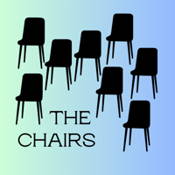
Overview
Synopsis
The Chairs is absurdist, tragic farce at its finest. It depicts an Old Man and Old Woman who sit in their house, night after night, telling the same ritualistic story. In an unspecified post-apocalyptic world, they are cut off from the outside world and must rely on their memories and tales of what once was. We learn that the Old Man is to reveal his prophetic message to many invited guests that evening. However, the twist is that the “guests” are invisible” and we only hear the Old Man and Old Woman’s side of the conversations. One by one they arrive, from The Lady, to the Colonel, and culminating finally with the appearance of the invisible Emperor. More chairs are dragged out to accommodate the growing number of guests but frivolity and frenzy soon gives way to a sense of confusion and despair. Finally, the Orator arrives to convey the Old Man’s message to the room. Unlike the other guests, he is visible but he is also mute. Believing the situation to be safe in the hands of the Orator, the Old Man and Old Woman leap to their deaths through an open window, shouting “Long live the Emperor!” Left alone on stage, the Orator scribbles some random words on the blackboard and takes his leave.
Written just seven years after the end of World War Two, The Chairs is a tale of loneliness and futility in an ever-changed and unrecognizable world.
Show Information
Context
Plot
Characters
| Name | Part Size | Gender | Vocal Part |
|---|---|---|---|
|
Lead |
Male |
Non-singer |
|
|
Lead |
Female |
Non-singer |
|
|
Supporting |
Male |
Non-singer |
Songs
A song with an asterisk (*) before the title indicates a dance number; a character listed in a song with an asterisk (*) by the character's name indicates that the character exclusively serves as a dancer in this song, which is sung by other characters.
Monologues
Scenes
Key Terms
Absurdism is a 20th-century theatrical style that reflects the belief that life lacks inherent meaning. Playwrights such as Samuel Beckett and Eugène Ionesco used illogical dialogue, repetition, and surreal situations. The genre emphasizes the futility of human struggle and the breakdown of communication.
Farce is a comedic style that emphasizes exaggerated situations, improbable coincidences, mistaken identities, and rapid pacing. It often includes physical humor such as slamming doors, frantic chases, or characters hiding in plain sight. Farce is designed to generate nonstop laughter, often prioritizing chaos and absurdity over realistic storytelling.
Describes a genre or setting in theatre that explores life after societal collapse, often raising existential themes.
Videos
Quizzes
Themes, Symbols & Motifs
Sorry! We do not currently have learning modules for this guide.
Quote Analysis
Sorry! We do not currently have learning modules for this guide.
